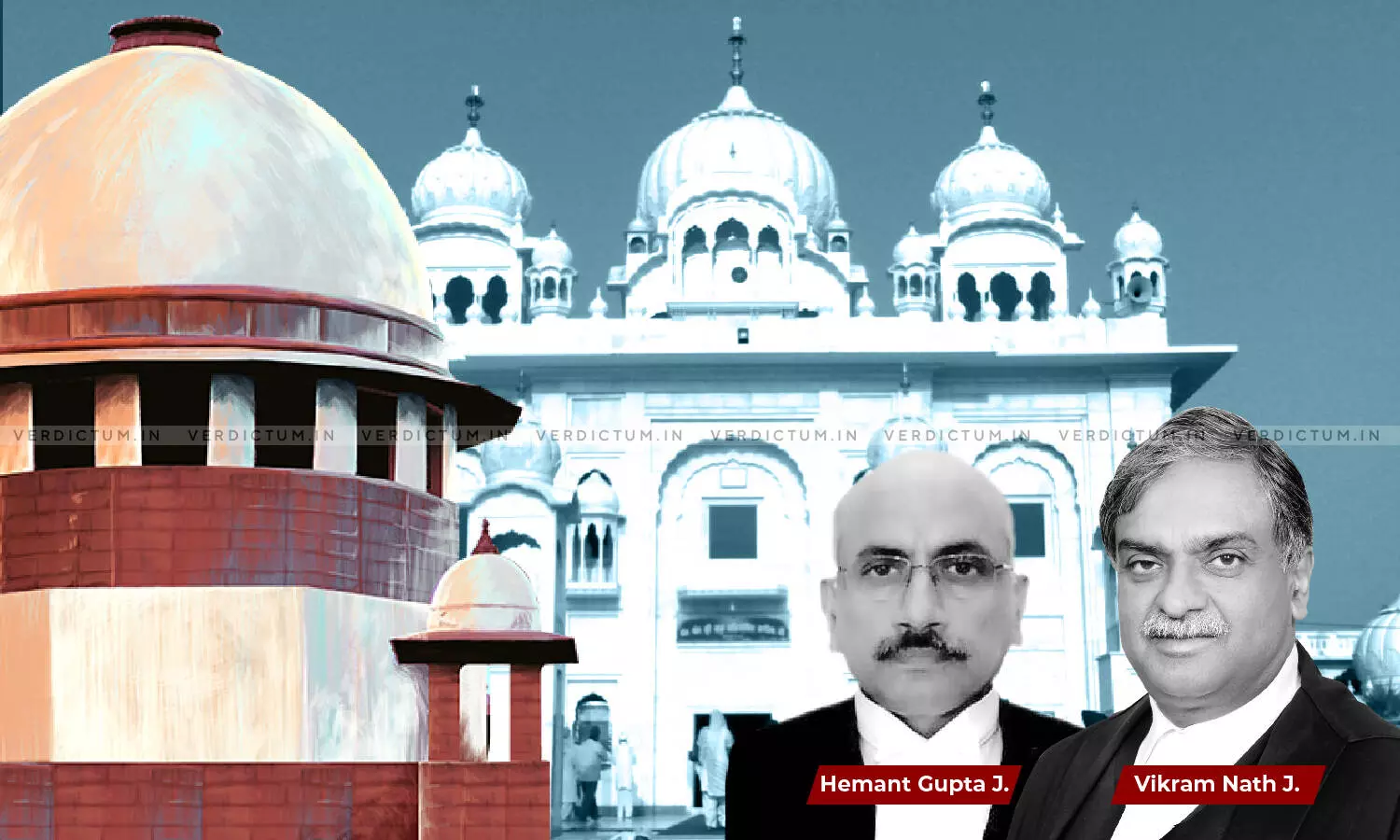
Not Violative Of Any Fundamental Right: SC Upholds Constitutional Validity Of Haryana Sikh Gurdwara (Management) Act 2014
 |
|The Supreme Court has upheld the constitutional validity of the Haryana Sikh Gurudwara (Management) Act 2014 which was challenged by way of Writ Petitions before the Court on the ground that it violates fundamental rights guaranteed under Part III of the Constitution.
The Bench of Justice Hemant Gupta and Justice Vikram Nath while dismissing the Petitions observed –
"Since the affairs of the Sikh minority in the State are to be managed by the Sikhs alone, therefore, it cannot be said to be violative of any of the fundamental rights conferred under Articles 25 and 26 of the Constitution."
Writ Petitions were preferred before the Supreme Court challenging the 2014 Act creating a separate juristic entity for the management of historical Gurdwaras in the State of Haryana mentioned in Schedule I; Gurdwaras having an income of more than 20 lakhs in Schedule II and the Gurdwaras having an income of less than Rs. 20 lakhs in Schedule III.
It was urged before the Court that the Sikh Gurdwaras in the State are being governed by the provisions of the Sikh Gurdwaras Act 1925 and the rules and regulations made thereunder, but in view of the demands of the Sikhs in the State of Haryana which were examined by two committees, it was decided to introduce the Haryana Sikh Gurdwara Management Bill, 2014 l in terms of powers conferred under Article 246 read with Schedule VII, List II, Entry 32 of the Constitution of India, as also in pursuance of Section 72 of the Punjab Reorganisation Act, 1966. It is thereafter, that the Haryana Act was enacted which came into force on July 14, 2014.
The first Writ Petition was filed by a resident of Haryana and an elected representative of Shiromani Gurdwara Prabandhak Committee from Kurukshetra. It was contended that the Haryana Act is against the constitutional provisions, and the statutory provisions of the Punjab Reorganization Act 1966 and is also divisive in its intention to create dissensions amongst the followers of the Sikh religion. It was also contended that the Act infringes the fundamental rights conferred on the Petitioner under Part III of the Constitution.
The second Writ Petition was preferred by the SGPC challenging the Haryana Act on almost similar grounds.
Senior Counsel Rakesh Dwivedi appeared for the Petitioner, Senior Counsels Shyam Divan and Ranjit Kumar appeared for the State of Haryana before the Apex Court.
- The issues dealt with by the Court were –
1) Whether any fundamental rights of the petitioners under Articles 25 and 26 of the Constitution of India are violated, so as to entitle the petitioners to invoke the jurisdiction of this Court under Article 32 of the Constitution.
2) Whether Section 72 of the Punjab Reorganisation Act, 1966 and Sections 3 and 4 of the Inter-State Corporation Act, 1957 were transitional provisions to meet the immediate requirement of the issues arising out of creation of separate States.
3) Whether the impugned enactment (Haryana Act) falls within the legislative competence of the Haryana State Legislature or does it fall under Entry 44 of List I of the Seventh Schedule of the Constitution.
4) Whether the Impugned Act falls in List-III (Concurrent List) of Schedule VII, which required the assent of the President of India as per Article 254(2) of the Constitution of India, and in the absence of such assent, void.
The Court noted, "It is not disputed that the Haryana Act is similar to the 1925 Act having similar provisions of constituting a committee to manage the affairs under the Act. The Haryana Committee is the Committee constituted under Section 3 of the Haryana Act for the management and control of the Gurdwaras and Gurdwara properties within the State of Haryana. The Gurdwara property in terms of Section 2(f) of the Haryana Act means all movable and immovable properties of a Gurdwara or any institution which, immediately before the appointed day, vested or was kept in deposit in the name of any Board, Trust, Committee, Gurdwara Management or was being regulated under the provisions of the 1925 Act."
Further, the Bench also observed, "The members of the Committee have to be elected from the eligible voters who is Amritdhari Sikh, a Sikh, and who is eighteen years of age, but not a Patit Sikh and is not an insolvent, mentally retarded or an insane person. The co-option is from the members of the community alone. Therefore, the affairs of the religious minority in the State i.e., Sikhs is left in the hands of the Sikhs alone in the same manner as was under the 1925 Act. The Haryana Act also provides for Haryana Sikh Gurdwara Judicial Commission in the same manner as is provided under the 1925 Act. The affairs of the Gurdwara are again required to be managed by local Gurdwara Committee."
Thus, the Court held that since the affairs of the Sikh minority in the State are to be managed by the Sikhs alone, therefore, it cannot be said to be violative of any of the fundamental rights conferred under Articles 25 and 26 of the Constitution.
Accordingly, the Court dismissed the Petitions.
Cause Title – Harbhajan Singh v. State of Haryana & Ors.